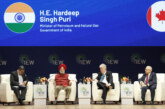 Had the Union government acted in time and stopped sale and use of some of the most hazardous chemicals like monocrotophos, which are already banned in other countries, the pesticide deaths in Yavatmal and other districts of Vidarbha could have been prevented.
Had the Union government acted in time and stopped sale and use of some of the most hazardous chemicals like monocrotophos, which are already banned in other countries, the pesticide deaths in Yavatmal and other districts of Vidarbha could have been prevented.
While there are over 100 dangerous pesticides that are used in India, but banned in other countries, the government gave a list of just 66 of these to be reviewed by a committee headed by Anupam Verma, former professor of Indian Agriculture Research Institute (IARI), in 2013. And sadly , the Verma committee, which submitted its report in December 2015, didn’t act professionally and hushed up the issue by merely continuing ban on the already banned 18 pesticides without reviewing them.
The committee recommended banning 12 more pesticides, that too from January 1, 2018. It also advised a review of 27 chemicals again in 2018 and suggested phasing out of six pesticides by 2020.This clearly reflects on the half-hearted attempt of the committee, which also left out endosulphan on the pre text that Supreme Court has ordered its banning.
Farmers’ activist Kavitha Kuruganti of India for Safe Food says, “In other countries, pesticides are reviewed every five years. But in India, there is no such review. The Indian government has failed to keep itself updated on the whole issue of regulation of pesticides. If it doesn’t have the necessary expertise, it should seek guidance from other countries when they sit together in the WHO’s joint reviews.“
Kuruganti said it was surprising that the government has left known carcinogen chemical, glyphosate, out of the list of the chemicals to be reviewed.
“Such blatant omissions make us conclude that either the government is not serious about reviewing such toxic chemicals or is trying to protect the business interests of particular MNCs like Monsanto, which profiteer by glyphosate-tolerant GM crops, selling both GM seeds and accompanying chemicals.
“Isoproturon is another example of a pesticide not listed among the 66 pesticides that were mentioned in the Parliament. Banned in UK and Denmark, it is one of the largest used herbicides in India,“ reads a letter written by Kuruganti to Radhamohan Singh, Union minister for agriculture, farmer welfare.
The letter says that in the absence of any end use regulation in India, which otherwise is near impossible to implement, there is need for severe restrictions on licensing and sale. It also says that out of the 261 registered pesticides in country , only 28 have been banned in all these years -from 1968 when the Insecticides Act was enacted. “This makes us wonder if the committee was influenced,“ says Kuruganti.
11 new cases of poisoning in Maha
Eleven new cases of pesticide poisoning were brought in at the GMC and rural hospitals in Yavatmal on Sunday. Though no death was reported till filing of this report, 7 patients are in a very critical condition. According to acting dean Dr Manish Shrigiriwar of Yavatmal GMC, five patients were admitted on Sunday taking the total number of patients undergoing treatment there to 22. TNN



